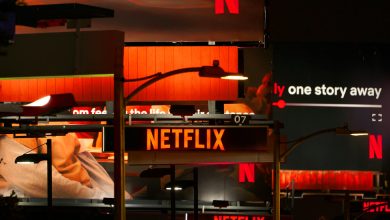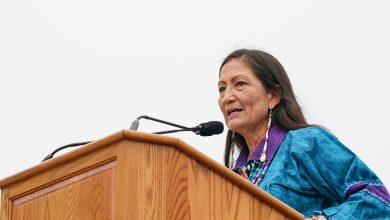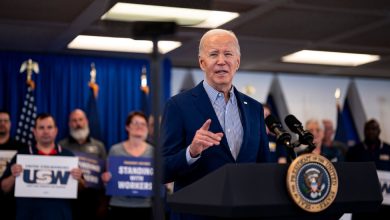Will Olympics Sponsors Face Blowback Over Peng Shuai?


An assertion by Olympic organizers that Peng Shuai is safe hasn’t allayed critics’ fears.Credit…Greg Martin/Ioc/Via Reuters
Could the Peng Shuai controversy tarnish Olympic sponsors?
Over the weekend, the International Olympic Committee drew criticism for saying it was reassured about the safety of the Chinese tennis star Peng Shuai, whose whereabouts have been a mystery since she accused a former government official of sexual assault. The I.O.C.’s statement, which didn’t mention the accusations, did little to quell the controversy — and now, a little more than two months before the Winter Olympics in Beijing, the event’s sponsors face tough questions of their own.
The I.O.C.’s announcement didn’t convince many — and neither have Beijing’s assertions. The Olympic organizers said they held a 30-minute video call with Peng, the latest in a string of seemingly stage-managed appearances by the tennis star that have done little to assuage critics. Today, China’s foreign ministry decried the coverage of Peng’s case as “malicious hype.”
The Women’s Tennis Association, which has threatened to withdraw its tournaments from China, repeated a call to investigate Peng’s allegations. And Global Athlete, an advocacy group for athletes, said the I.O.C. had demonstrated “an abhorrent indifference to sexual violence and the well-being of female athletes.” The I.O.C. told DealBook in a statement that in its conversation with Peng, “she was very clear in confirming that she is safe and well.” The group added, “Safeguarding the well-being of athletes is paramount to the I.O.C. and the Olympic movement.”
Olympic sponsors have stayed quiet. Of the 15 companies listed as “partners,” representatives for Airbnb and Coke declined to comment, while others did not respond to requests for comment. (Despite being described as a partner, G.E. ended its Olympics ties this year.) Companies face opposing pressures:
-
Consumers and athletes now demand more of sponsors. Some top sponsors of U.S.A. Gymnastics abandoned the organization when it became embroiled in a sexual abuse scandal, and Simone Biles left Nike for a brand that she said was better aligned with her values. Top tennis stars like Naomi Osaka, Roger Federer and Serena Williams have expressed concern about Peng, raising the prospect that they might pressure their brand sponsors to also speak out.
-
Businesses fear riling Beijing and losing access to the huge Chinese market. Questioning the government’s line could put tens of billions of dollars in sales at risk. Pointedly,this week the Chinese government said it would punish companies that it deemed supporters of Taiwan’s independence.
Experts are split on the reputational risk for sponsors. If the Peng situation remains in the spotlight during the Olympics, “I can certainly see some brands becoming more wary of their association,” said Brayden King, a management professor at Northwestern University. Others downplayed the risk: “It doesn’t matter where the games are,” said Rick Burton, the chief marketing officer for the U.S. Olympic Committee for the 2008 Beijing Games, “there’s controversy that something is not right.” If you’re a top I.O.C. top sponsor, Burton said, “you know what you’re getting into.”
HERE’S WHAT’S HAPPENING
JPMorgan Chase and Goldman Sachs are ordered to raise their capital reserves. The Financial Stability Board told the banks to bolster their buffers against economic disaster, to guard against the risks related to the rise in lending during the pandemic.
The U.S. will tap its national oil reserves. The White House said this morning that it would release 50 million barrels from the Strategic Petroleum Reserve, in a move that it coordinated with countries like Britain, China and India to help lower gas prices. That may draw the ire of OPEC.
Samsung will build a $17 billion chip plant in Texas. The city of Taylor won the contest to host the semiconductor factory, The Wall Street Journal reports, which Samsung is building amid a push by the U.S. to produce more computer chips. Local officials estimate that the plant could create some 1,800 jobs.
Jeff Bezos pledges $100 million to Barack Obama’s foundation. The gift is the largest yet for the former president’s foundation, though it’s far from Bezos’ biggest: A $166 million donation to NYU Langone Health was also announced yesterday.
Athenahealth becomes the latest big leveraged buyout. The health technology company was sold to Hellman & Friedman and Bain Capital for $17 billion, as private equity firms take advantage of favorable conditions like low interest rates to strike deals. Even bigger buyouts may lie ahead, including KKR’s $37 billion bid for Telecom Italia.
Zoom’s stock falls amid slowing sales. Shares in the videoconferencing company fell in after-hours trading after it announced better-than-expected quarterly results, but warned that revenue growth would slow as workers increasingly return to the office.
Jeffrey Epstein’s final days
Newly released records show that Jeffrey Epstein, the financier jailed in 2019 on federal sex trafficking charges, created illusions until the very end, deceiving correctional officers, counselors and other inmates assigned to monitor him around the clock. Epstein died by suicide in his cell after just over a month in a Manhattan jail.
More than 2,000 pages of Federal Bureau of Prisons records, obtained by The New York Times after filing a Freedom of Information Act lawsuit, provide the most detailed look yet at Epstein’s final days. Since his death, a number of powerful executives and other public figures have faced reckonings — and resignations — over their ties to the convicted sex offender.
The records offer no support to conspiracy theories about Epstein’s death, but they do paint a picture of incompetence and sloppiness by some at the detention center. Jail personnel left him alone in his cell on the night of his death, despite explicit instructions to assign him a cellmate. Epstein often avoided his cell by spending time in conference rooms with his lawyers. In conversations with counselors and other inmates, he offered investment advice, reminisced about socializing with celebrities and complained about the jail’s conditions.
Read the full account of Epstein’s time in jail.
“If JPM doesn’t withdraw their lawsuit, I will give them a one star review on Yelp. This is my final warning!”
— Elon Musk, to The Wall Street Journal, on the escalating feud between Tesla and JPMorgan Chase, which broke into the open last week when the bank sued Musk’s firm over the terms of trades it had set up with the carmaker.
Jay Powell’s second-term priorities
President Biden yesterday nominated Jay Powell for a second term as the chair of the Federal Reserve. In doing so, the president resisted a push from progressives to give the top job to Lael Brainard, a Fed governor who wants the central bank to be more active in climate-related issues and tougher on regulation. Biden instead picked Brainard to be vice chair.
Senator Elizabeth Warren, Democrat of Massachusetts, said she would oppose Powell’s reappointment, even as other prominent Democrats backed him. Republicans, many of whom support Powell, expressed concern about Brainard, who enjoys broad support among Democrats. Both Powell and Brainard must win 60 votes to be confirmed by the Senate.
Biden sticks with the status quo — will Powell? The president’s decision was a return to tradition in which the central bank’s top official is reappointed regardless of partisan identity — a norm bucked by former President Donald Trump, who appointed Powell, a Republican, instead of renominating Janet Yellen, a Democrat.At a news conference, Biden said he was confident that the Fed’s top team would be able to keep inflation low, prices stable and employment growing (listed in that order). The recent rise in inflation appears to be hurting Biden politically.
Amid the worries about rising prices, the question now is whether Powell will stick to his approach, which is based on a belief that the economy still has room to grow and inflation will fade, in his second term. This view is being challenged by shifting economic conditions, and Powell’s reappointment could lead to changes in the way the Fed manages the economy and regulation:
-
Interest rates are expected to rise faster, with Powell seen as a more hawkish choice for chair. Bank of America’s top U.S. economist, Michelle Meyer, said that Powell’s reappointment reaffirmed “our confidence in higher U.S. interest rates.” Adam Posen of the Peterson Institute for International Economics said he now expected three rate increases next year instead of two. Bond investors appeared to agree, pushing up yields yesterday.
-
Biden sent a signal on regulation with an appointment that he didn’t make. Many Fed watchers expected that if Brainard didn’t get the Fed chair job, she would be named the vice chair in charge of bank supervision. Instead, Biden elevated her to a role with more power over monetary policy, leaving the Fed’s top regulation job open. That could mean that Biden is looking to avoid a fight in filling that position: Brainard has argued for stricter bank regulation and for lenders to look more critically at the loans they make to the fossil fuel industry, neither of which is popular with Republicans.
Further reading:
-
What Powell’s renomination means for banks.
-
Are markets overreacting to the Fed leadership drama?
-
The next steps Biden could take to remake the Fed’s board.
THE SPEED READ
Deals
-
Alden Global Capital has bid $141 million for Lee Enterprises, the newspaper chain once owned by Warren Buffett. (NYT)
-
The crypto exchange Binance is in talks to raise funds from sovereign wealth funds. (FT)
-
The sharp plunge in Paytm’s stock has cast a pall over I.P.O.s in India. (Bloomberg)
-
Manscaped, the men’s grooming products company, is going public via SPAC, with help from Guggenheim Partners and the actor Channing Tatum. (Bloomberg)
Policy
-
A dozen state attorneys general called on Ben & Jerry’s to end its boycott of Israeli-occupied territories. (NY Post)
-
The Israeli spyware maker NSO is at risk of default after the U.S. imposed sales restrictions on its products. (Bloomberg)
-
American Express pitched businesses a tax break that fell foul of the I.R.S. (WSJ)
-
“‘Vaccinated, Recovered or Dead’: Europe Fights Covid Wave — and Itself” (NYT)
Best of the rest
-
In her second day of testimony, Elizabeth Holmes relied on failure as a defense. (NYT)
-
How the audio chat start-up Clubhouse became a pandemic darling, until it wasn’t.(Insider)
-
The aftermath of a crypto collective’s failed bid for a copy of the U.S. Constitution has become an expensive mess. (Vice)
-
Inside the big business of being world chess champion. (NYT)
-
The year’s 100 notable books, selected by the editors of The New York Times Book Review. (NYT)
THE SPEED READ
Deals
-
Alden Global Capital has bid $141 million for Lee Enterprises, the newspaper chain once owned by Warren Buffett. (NYT)
-
The crypto exchange Binance is in talks to raise funds from sovereign wealth funds. (FT)
-
The sharp plunge in Paytm’s stock has cast a pall over I.P.O.s in India. (Bloomberg)
-
Manscaped, the men’s grooming products company, is going public via SPAC, with help from Guggenheim Partners and the actor Channing Tatum. (Bloomberg)
Policy
-
A dozen state attorneys general called on Ben & Jerry’s to end its boycott of Israeli-occupied territories. (NY Post)
-
The Israeli spyware maker NSO is at risk of default after the U.S. imposed sales restrictions on its products. (Bloomberg)
-
American Express pitched businesses a tax break that fell foul of the I.R.S. (WSJ)
-
“‘Vaccinated, Recovered or Dead’: Europe Fights Covid Wave — and Itself” (NYT)
Best of the rest
-
In her second day of testimony, Elizabeth Holmes relied on failure as a defense. (NYT)
-
How the audio chat start-up Clubhouse became a pandemic darling, until it wasn’t.(Insider)
-
The aftermath of a crypto collective’s failed bid for a copy of the U.S. Constitution has become an expensive mess. (Vice)
-
Inside the big business of being world chess champion. (NYT)
-
The year’s 100 notable books, selected by the editors of The New York Times Book Review. (NYT)
We’d like your feedback! Please email thoughts and suggestions to [email protected].




